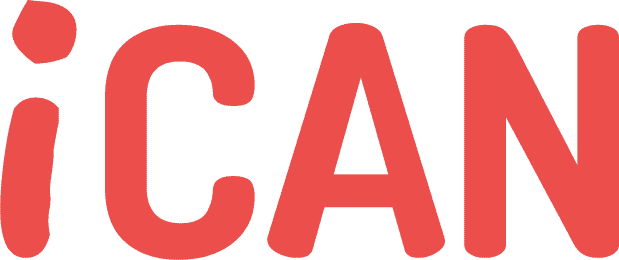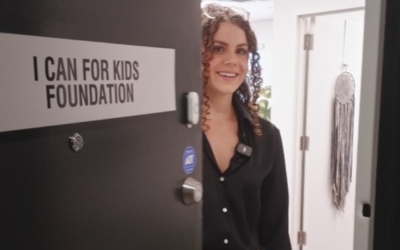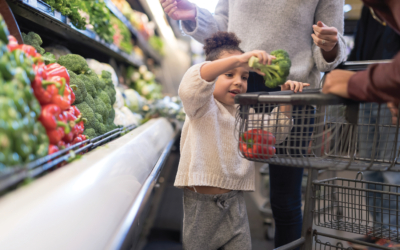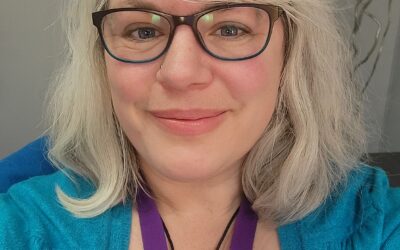Inclusiveness is a core value of the I Can for Kids (iCAN) grocery gift card program. Our expansive network of agency partners enhances our inclusive approach by maximizing our ability to reach diverse households across Calgary. This enables us to extend our support to everyone regardless of culture, race, gender, religion, sexual orientation, health status, and physical and cognitive ability.
In this blog, we speak to the connection between food insecurity and racial, sexual, and gender identities. Despite the many unique barriers that each of these social groups face, we chose to combine these topics into a single blog because there are so few high-quality studies to describe the experiences of food-insecure children and families within these households. We’ve also published more in-depth articles about other diverse populations at higher risk for food insecurity who access our program, including:
- Indigenous households
- families living with disabilities
- children and parents struggling with poor mental health
- kids from immigrant and refugee families
- people who have neurological conditions
- families with specific religious dietary requirements
What’s the link between food insecurity and racial identity?
Based on the first four years of our grocery gift card program, iCAN consistently provides support to a high proportion of racialized populations. The most recent census shows that 41% of Calgarians identify as a visible minority. Our agency partners estimate that at least 60% of the families who access our program are led by a visible minority (defined as: a person who is non-Caucasian in race or non-white in skin colour but does not include Indigenous Peoples).
Research in Canada outlines the relationship between food insecurity and racial identity by noting how:
- more than 1 in 3 black children live in a food-insecure home compared to 1 in 9 white children
- nearly 40% of black adolescents live in a food-insecure home compared to 20% of adolescents in the general population
- approximately 1 in 2 Black children, 1 in 3 Arab children, and 1 in 3 Filipino children live in a food-insecure home compared to 1 in 5 Caucasian children
- households whose main income earner is black are nearly twice as likely to report food insecurity than a white household regardless of whether they are a refugee, immigrant, or natural-born citizen
- about 20% of the white population in Canada lives in a food-insecure household, whereas 40% of Black individuals, 27% of Filipino people, 31% of Latin American persons and nearly 26% of the Southeast Asian and Arab populations live in a food-insecure household
Experts highlight that discrimination based on culture, ethnicity, or race can have a significant impact on household income by impairing the ability to find and maintain regular employment, secure higher wages, and access promotions in the workplace. iCAN is very grateful to partner with two prominent, immigrant-serving organizations and multiple social service agencies whose reach extends to the many racialized and multicultural populations across the city. Agency staff are also well versed to help food-insecure families navigate additional programs, systems, and supports that promote well-being and enhance protection from social biases and racism.
What’s the link between food insecurity and gender and sexual identities?
Neither iCAN nor our agency partners can accurately track the number of food-insecure families who access our program and have one or more members from the 2SLGBTQI+ community (two-spirit, lesbian, gay, bisexual, transgender, queer, intersex). Staff only become aware of this type of personal information if a parent or household member mentions it during ongoing interactions. Furthermore, many of our recipients are immigrants and refugees from cultures that tend to be less comfortable engaging in open discussions about sexuality and gender. For these reasons, iCAN intentionally partners with agencies whose mission, services, and intake processes never discriminate against sexual and gender minorities.
Research into the dynamics between income and food insecurity among 2SLGBTQI+ households is still at an early stage. It can be challenging to engage enough study participants from these relatively small social groups, particularly two-spirited, intersex, transgender, and other gender minority populations. The most current municipal population profile indicates there are 4,640 transgender and non-binary individuals living in Calgary, and about two-thirds of this population are between the ages of 15 to 34 years. The latest federal census data states that among all Canadians aged 15 and older:
- 4% (1 million people) identify as lesbian, gay, bisexual, or non-heterosexual
- 0.20% (59,460 people) identify as transgender
- 0.14% (41,355 people) identify as non-binary
Studies in Canada have found that in contrast to heterosexual and cisgender adults:
- bisexual men and women earn the least income followed by gay men and next by lesbian women
- bisexual adults are three times more likely to be food insecure while lesbian and gay populations appear to experience just a slight increase
- transgender men and women are at least 50% more likely to live in poverty whereas non-binary individuals experience twice the risk
- one-third of LGBTQ2+ individuals struggle to meet their basic needs (including food) while only one-quarter of non-LGBTQ2+ people face this same struggle
- 65% of LGBTQ2+ individuals earn less than $40,000 per year compared to 50% of the non-LGBTQ2+ population (even though both groups have achieved very similar levels of education)
Studies provide even less detail about the experiences and rates of food insecurity among 2SLGBTQI+ households with children. Researchers propose that these families are likely at higher risk because they face additional social barriers, such as:
- more experiences of discrimination, aggression, and violence
- greater struggles to find employment and secure jobs with higher salaries
- larger hurdles to receive adequate assistance through healthcare programs
- increased rates of denial for access to charitable services, including free food programs
Fortunately, all our agency partners welcome 2SLGBTQI+ families and can help parents and children access supports that help address or reduce social, cultural, and systemic roadblocks.
When you donate today, you restore a fundamental sense of community and social inclusion for food-insecure children and families in Calgary who face unjust barriers.
To join iCAN’s expanding list of donors, sponsors, and champions, check out the different ways you can get involved or donate.
To learn more about I Can for Kids and their unique approach to childhood food insecurity, visit www.icanforkids.ca
About Donald Barker
Donald Barker has worked as a registered dietitian for more than 25 years. He also has a professional background in communications and has long advocated for populations who face adverse, unjust, or systemic barriers that lead to higher rates of poor social, mental, emotional, and physical health outcomes. Donald currently volunteers as an Advisor with iCAN to support our transition towards evidence-based approaches that help improve the well-being of children in Calgary who live in low-income and food-insecure households.
About I Can for Kids Foundation
I Can for Kids works closely with multiple agency partners to target and distribute grocery gift cards to food-insecure families who are most in need. The iCAN grocery gift card program is a more dignified and inclusive approach to dealing with food insecurity, allowing families to shop where everyone else shops and to choose foods that are appropriate for their health and cultural needs. Explore their website to discover more about iCAN’s impact over the years.
For more information and media inquiries, please contact iCAN Executive Director, Bobbi Turko at bobbi@icanforkids.ca.




